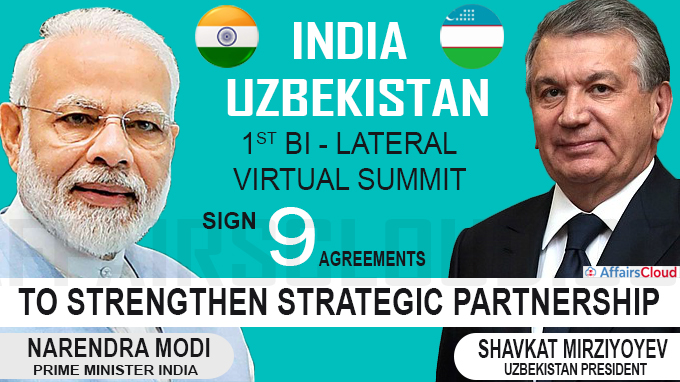
On December 11, 2020 the first bilateral virtual summit between India and Uzbekistan was co-chaired by Prime Minister (PM) Narendra Modi and President of the Republic of Uzbekistan Shavkat Miromonovich Mirziyoyev to discuss the entire gamut of bilateral relationship, including strengthening India-Uzbekistan cooperation in the post-COVID-19 world between both nations. Both sides also exchanged views on regional and global issues of mutual interest.
During the summit both sides signed the 9 following Agreements/ Memorandum of Cooperation (MoC)/Memorandum of Understanding (MoU):
| Agreements | Indian Side | Uzbekistan Side
|
|---|---|---|
| MoC | Indian Computer Emergency Response Team (CERT-In) , MeitY | State unitary enterprise Cybersecurity center |
| MoC on Digital Technologies | Ministry of Electronics and Information Technology (MeitY) | Ministry for Development of Information Technologies |
| MoU | National Institute of Solar Energy (NISE), Ministry of New and Renewable Energy | International Solar Energy Institute, Uzbekistan |
| MoU | Sardar Vallabhbhai Patel National Police Academy (SVPNPA) | Academy of the Ministry of Internal Affairs |
| MoU | Indian Institute of Mass Communication (IIMC) | University of Journalism and Mass Communication of Uzbekistan (UJMCU). |
| MoU on High Impact Community Development Projects (HICDP) | Government of India (GoI) | Government of Uzbekistan |
| MoU on exchange of information on pre-arrival of goods moved across the state border | Central Board of Indirect Taxes and Customs (CBIC) | State Customs Committee |
| Agreement on Mutual Recognition of results of products Conformity Assessment | Bureau of Indian Standards (BIS) | The Uzbek Agency for Standardization, Metrology and Certification (Uzstandart Agency) |
| Dollar Credit Line Agreement | Export-Import Bank of India | Government of Uzbekistan |
Following the summit, a joint statement on close friendship and strong partnership between Uzbekistan and India was also adopted.
Key Points from Joint Statement:
–Both nations have set a target to boost USD 1 billion for bilateral trade in the next few years.
— Indian side confirmed the approval of USD 448 million of Line of Credit (LoC) for four developmental projects in Uzbekistan in the fields of road construction, sewerage treatment and information technology.
- India had announced a USD 1-billion line of credit to Uzbekistan in 2018.
–The leaders instructed their officials to fast-track the conclusion of the ongoing Joint Feasibility Study for the commencement of negotiations on a Preferential Trade Agreement.
—Both nations agreed to work towards an early conclusion of the Bilateral Investment Treaty for further improvement of trade and economic cooperation.
— India and Uzbekistan expressed their unanimity in their support for a united, sovereign and democratic Islamic Republic of Afghanistan.
–The free economic zones of the two countries provide great investing opportunities, including the Uzbek-Indian free pharmaceutical zone in the Andijan region of Uzbekistan.
–Both nations will work toward the enhancement of business cooperation through the established institutional mechanism of the Uzbekistan-India Business Council run by the Confederation of Indian Industry (CII) and the Chamber of Commerce & Industry of Uzbekistan (Uz-CCI).
–The leaders agreed to strengthen mutual cooperation in the field of science, technologies and innovation.
–There will be further strengthening of cooperation between the law enforcement agencies and special services under the framework of the Uzbekistan-India Joint Working Group on Counter-Terrorism.
–There will also be an enhancement of bilateral civil nuclear cooperation as part of an agreement between the Global Centre for Nuclear Energy Partnership, India and the Agency for Development of Nuclear Energy, Uzbekistan.
— Both sides decided to explore connectivity routes through International North-South Transport Corridor (INSTC) and will also work upon to hold trilateral dialogue among India, Iran and Uzbekistan to promote connectivity through the Chabahar port.
- INSTC is a 7,200-km-long multi-mode network of ship, rail, and road route for moving freight between India, Iran, Afghanistan, Azerbaijan, Russia, Central Asia and Europe.
–The Indian side offered customized scholarship opportunities provided by the Indian Council for Cultural Relations (ICCR) under the Indian Technical and Economic Cooperation (ITEC) programme.
–Uzbekistan reaffirmed its support to India’s candidature for permanent membership of the United Nations Security Council (UNSC) and congratulated India on its election as a non-permanent member of the UNSC for the term 2021-22.
— The Uzbek side thanked the Indian side for the deputation of an Indian expert to develop IT (Information Technology) Parks in Uzbekistan and establishment of an India Room in the Armed Forces Academy of Uzbekistan.
Click Here for Official Joint Statement
Recent Related News:
i.On October 20, 2020, the 18th meeting of Prosecutors General of Shanghai Cooperation Organisation (SCO) Member States was virtually organized by the General Prosecutor’s Office of Uzbekistan from Tashkent where India was represented by Solicitor General (SG) Tushar Mehta.
ii.On November 6, 2020, an India-Italy virtual summit was held which was co-chaired by India’s Prime Minister Narendra Modi and Prime Minister of Italy Prof. Giuseppe Conte. Both leaders reviewed the framework of bilateral relationship
About Uzbekistan:
Capital– Tashkent
Currency– Uzbekistani soʻm
About International North–South Transport Corridor (INSTC):
INSTC project was initiated by Russia, India and Iran in September 2000 in St. Petersburg. The agreement was signed on 16th May 2002. The International North–South Transport Corridor (INSTC) is the ship, rail, and road route for moving freight between India, Russia, Iran, Europe and Central Asia
The current members are India, Iran, Russia, Azerbaijan, Kazakhstan, Armenia, Belarus, Tajikistan, Kyrgyzstan, Oman, Syria, Turkey, Ukraine, and Bulgaria (observer).




